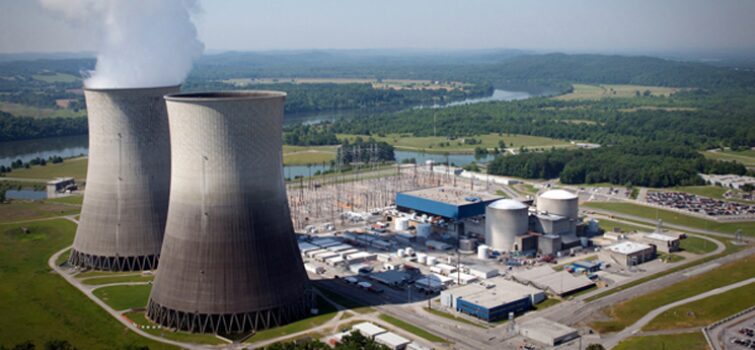Andrew Holness treading dangerous waters with nuclear technology
Andrew Holness seems to be treading dangerously close to the edge with nuclear technology, raising concerns about the potential risks involved. Is it wise to dabble in such a contentious field, especially when the implications could be so severe? One has to wonder if the benefits truly outweigh the dangers lurking in the shadows of this powerful energy source.
The Andrew Holness government announced on Tuesday (October 22), that it signed a Memorandum of Understanding (MOU) with Atomic Energy of Canada Limited and Canadian Nuclear Laboratories Limited for the advancement of nuclear technologies adoption in Jamaica.

Addressing the signing ceremony at Jamaica House, Prime Minister, Dr. the Most Hon. Andrew Holness, said the partnership reflects the Government’s unwavering commitment to diversify the country’s energy portfolio with new, clean and sustainable alternatives.
“[It] marks a pivotal moment in Jamaica’s energy transformation as we take a bold and forward-thinking step by signing this Memorandum of Understanding. This move is about reducing your cost of living, a major part of it being the cost of energy,” he stated.
Nuclear energy can be considered clean and sustainable in some ways, but there are also concerns about its long-term sustainability:
- Clean: Nuclear power plants produce almost zero carbon dioxide or other greenhouse gas emissions. They also don’t produce air pollutants like those from burning fossil fuels.
- Sustainable: Nuclear power can be a reliable source of energy for decades. It can also be more efficient than other energy sources, using less land and fewer materials.
- Safety: Nuclear power is considered the second safest source of energy in the world. Nuclear waste is carefully managed and regulated.
- Jobs : Nuclear power plants create long-lasting, high-paying jobs.
Concerns of Nuclear Energy
- Concerns: There’s no definitive way to dispose of spent nuclear fuel without risk. Nuclear waste management costs taxpayers billions of dollars.
- Non-renewable: Nuclear fuels, like uranium, are not renewable because they are a finite material.
Nuclear technology can be dangerous for a number of reasons, including:
- Radiation exposure: Nuclear accidents can release large amounts of radiation into the environment, which can cause immediate or delayed health effects:
- Acute Radiation Syndrome (ARS): High levels of radiation can cause ARS, which can lead to death.
- Cancer: Ionizing radiation from nuclear accidents can damage DNA, leading to cancer. Children and adolescents are more sensitive to the cancer-causing effects of radiation.
- Other health effects: Lower doses of radiation can cause cardiovascular disease, cataracts, and other health effects.
- Nuclear waste : Radioactive waste from nuclear plants can remain dangerous for thousands of years. The management of nuclear waste is a risk, and there are no long-term solutions in place.
- Weapons proliferation: The growth of nuclear energy has increased the ability of nations to obtain materials for nuclear weapons.
- Weather events: Extreme weather events can indirectly affect nuclear plants, such as by breaking dams or disconnecting the plant from the electricity grid.
- Cyber attacks :Cyber attacks, military aggression, and terrorist attacks could lead to severe nuclear accidents.

According to the Jamaica Information Service (JIS), Dr. Holness articulated that nations such as Canada and France are utilizing nuclear power as a viable solution to address energy challenges and climate change in a safe and effective manner.
He elaborated that France derives approximately 68 percent of its electricity from nuclear energy, while this source constitutes 15 percent of Canada’s total energy output.
The Prime Minister further emphasized that Canada is renowned for its stringent adherence to nuclear safety standards.
“These instances demonstrate that with appropriate regulation of the technology and the acceptance of technological advancements, nuclear energy has the potential to be transformative. In fact, contemporary nuclear technology, particularly small modular reactors, possesses significantly improved safety and adaptability compared to earlier models,” he stated.
Dr. Holness highlighted that small modular nuclear reactors provide enhanced safety features, reduced environmental impact, and offer a cost-effective solution for smaller nations like Jamaica.
He contended that harnessing this rapidly advancing technology will yield long-term benefits for Jamaica in the future.
“Of course, there are those who are going to say, why not wait until this technology is mature. The problem is that anything that has to do with nuclear requires a long period of time and it requires the development of local capabilities. If you don’t do it now, then not only will you have to import the capital and the actual small modular nuclear reactor, you’re going to have to import the technological skills and expertise as well, which will increase the cost of deployment. So Jamaica has to see what is going to come in the future,” the Prime Minister said.
Regarding safety, Dr. Holness pointed out that the technology has advanced over the years, noting that modern nuclear reactors are designed with fail-safe mechanisms that significantly reduce the risk of accidents.
“We know that safety is at the forefront of everyone’s minds when it comes to nuclear energy, and rightly so. But I want to emphasise that nuclear energy today is not what it was even a decade ago. For modern nuclear reactors, particularly small modular nuclear, we know that some of the designs shut down automatically,” he stated.
Dr. Holness said that as part of the exploration, work will be undertaken with global experts to ensure that every aspect of nuclear energy, particularly waste management, is handled with the highest international standards.
“Countries like Finland and Sweden have developed world-class systems for safety in terms of storing nuclear waste, and we will draw on their experience to ensure that Jamaica follows the best practices for protecting the environment and our people,” he stated.
The Prime Minister pointed out that Jamaica’s journey with nuclear technology began in 1984 with the establishment of the Caribbean’s first and only nuclear reactor at the University of the West Indies (UWI), Mona, with European Union (EU) support.
Dr. Holness said the facility is operated by the International Centre for Environmental and Nuclear Science (ICENS) and has been a beacon of nuclear research for four decades, advancing studies in agriculture, health and environmental protection.
Meanwhile, the Prime Minister advised that the Government is taking a comprehensive approach to diversifying Jamaica’s energy security.

He noted that 85 per cent of Jamaica’s energy is derived from fossil fuels, describing this as, “a dependency that leaves us vulnerable to external shocks and global oil and natural gas price fluctuations”.
“We have already made great strides in diversifying our energy mix. We have done exceptionally well in integrating solar, wind and natural gas and we do have some hydroelectric power… but there is far more to be done. Given Jamaica’s current energy demands, we are cognisant that there has to be a very well-thought-out mix… that is not subject to intermittency, and nuclear offers that as well,” Dr. Holness said.
He further indicated that Jamaica has commenced exploring the development of pumped hydro storage and waste to energy alternatives for power generation.
Meanwhile, Minister of Science, Energy Telecommunications and Transport, Hon. Daryl Vaz, said a key aspect of the agreement is the exchange of scientists, engineers and other specialists.
“This collaboration will foster the sharing of knowledge, skills and best practices, driving innovation in research, development and practical applications. Together we will build out a network of expertise that will benefit both Jamaica and Canada. Through organised seminars and meetings, we will ensure that our professionals remain at the forefront of nuclear technology and its peaceful applications,” he said.
Canadian Nuclear Laboratories Limited Board Director, Howard Shearer, said the discussions initiated with Dr. Holness last year aim to diversify, among other things, Jamaica’s energy mix.
President and Chief Executive Officer for Atomic Energy of Canada Limited, Fred Dermarker, said the partnership will advance ongoing discussions on nuclear science and related technologies.
“This event (MOU signing) is a testament of the strong and enduring relationship between our nations,” he pointed out.
Why not solar energy instead of nuclear technology?
According to most current data, solar energy is significantly cheaper than nuclear energy; the cost of generating electricity from solar is considerably lower than from nuclear power plants, making solar the more affordable option.

Key points about the cost comparison:
Lower Levelized Cost of Energy (LCOE):
Studies like those from Lazard consistently show that solar has a much lower LCOE compared to nuclear, meaning the average cost to produce a unit of electricity is significantly less for solar.
High upfront costs for nuclear:
While nuclear power plants may have lower operating costs, the initial construction and setup costs are substantially higher than for solar installations.
Falling solar costs:
The cost of solar technology continues to decrease rapidly, making it even more competitive against nuclear.
Solar Energy is safer
According to most experts, solar energy is generally considered safer than nuclear energy. Solar energy doesn’t produce harmful byproducts and poses minimal risk to people during installation and operation. Nuclear power plants, on the other hand, can have accidents involving radioactive material, even with strict safety measures in place.
Key points to consider:
Solar safety:
Solar panels produce electricity from sunlight with minimal risk of harm, and any potential dangers are primarily related to installation and maintenance, like electrical shock from improper handling.
Nuclear safety concerns:
While nuclear power plants are designed with safety in mind, accidents like meltdowns can release significant amounts of radiation, causing long-term health risks.
Solar energy is the radiant heat and light from the sun that can be captured and used to generate electricity, create heat, or cause chemical reactions. It is a renewable energy source that is non-polluting and has an inexhaustible supply.
Solar energy can be harnessed in a number of ways, including:
Solar power: Also known as solar electricity, this is the process of converting sunlight into electricity. Solar panels use the photovoltaic effect to convert light into an electric current.
Solar thermal energy: Another way to harness solar energy.
Solar architecture: A way to use solar energy.
The amount of solar radiation that reaches a specific location on Earth varies, but the total amount of solar energy that reaches Earth is much greater than the world’s current and projected energy needs.
